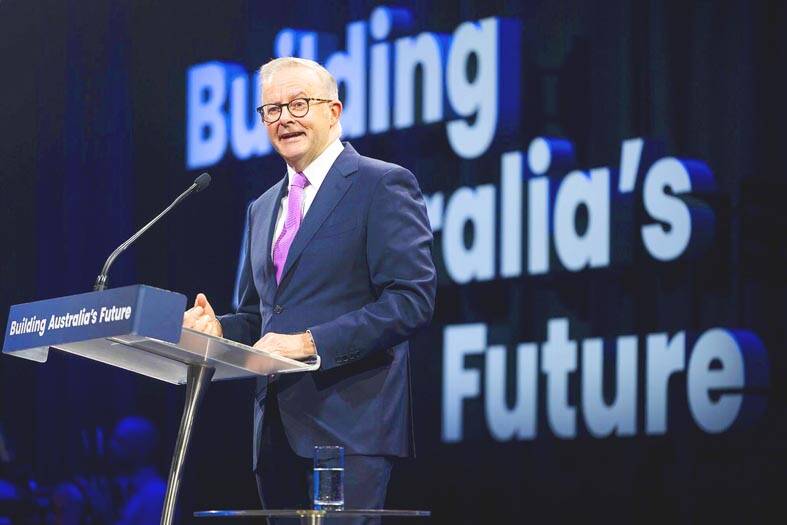The nation is to stockpile critical minerals in a new strategic reserve, Australian Prime Minister Anthony Albanese said yesterday, as nations scramble to source rare earths and coveted metals outside China.
Mining superpower Australia sits on bulging deposits of lithium, nickel and cobalt — metals used in everything from smartphones to electric vehicles — but most of this boon is sold as raw ore to processing factories in China, which has a choke hold on the global supply of finished critical minerals.
Albanese said Australia would start stockpiling these commodities at home, striking deals to sell them to other “key partners.”

Photo: Bloomberg
“Increasingly uncertain times call for a new approach to make sure Australia maximizes the strategic value of critical minerals,” he said in a statement. “We need to do more with the natural resources the world needs, and that Australia can provide.”
Australia would initially set aside A$1.2 billion (US$765 million) to get the reserve up and running.
Albanese’s government has previously suggested Australia could use its critical minerals as a bargaining chip in tariff talks with the US. Australia sits on some of the largest lithium deposits in the world, and is also a leading source of lesser-known rare earths such as neodymium.
Major manufacturing nations such as the US, Germany and Japan are eager to obtain these critical minerals from sources other than China. Japan has its own critical minerals stockpile, while the US has been investing in metals refineries and other processing technology.
“The ability for the government to stockpile is an important safeguard against market pressure, as well as interventions from other nations,” Albanese said in a speech later yesterday. “It means Australia has the power to sell at the right time to the right partners for the right reasons.”
Critical minerals loom as a likely new front in the unfolding trade war between Washington and Beijing. US President Donald Trump last week ordered a probe that could result in new tariffs targeting China.
Trump’s order stated that the US was dependent on foreign sources of critical minerals, putting its military and energy infrastructure at risk.
China has shown a willingness to hold rare earths to ransom in the past. At the height of a diplomatic dispute in 2010, China effectively banned the export of rare earths to Japan. The move rattled Japan’s auto industry, which was heavily reliant on certain rare earths to build magnets used in motors.
China controls about 90 percent of the world’s supply of rare earths — a subset of critical minerals — and is fiercely protective of its position. Beijing has banned the export of processing technology that could help rival nations and has been accused of using state-imposed quotas to control supply.

In Italy’s storied gold-making hubs, jewelers are reworking their designs to trim gold content as they race to blunt the effect of record prices and appeal to shoppers watching their budgets. Gold prices hit a record high on Thursday, surging near US$5,600 an ounce, more than double a year ago as geopolitical concerns and jitters over trade pushed investors toward the safe-haven asset. The rally is putting undue pressure on small artisans as they face mounting demands from customers, including international brands, to produce cheaper items, from signature pieces to wedding rings, according to interviews with four independent jewelers in Italy’s main

Japanese Prime Minister Sanae Takaichi has talked up the benefits of a weaker yen in a campaign speech, adopting a tone at odds with her finance ministry, which has refused to rule out any options to counter excessive foreign exchange volatility. Takaichi later softened her stance, saying she did not have a preference for the yen’s direction. “People say the weak yen is bad right now, but for export industries, it’s a major opportunity,” Takaichi said on Saturday at a rally for Liberal Democratic Party candidate Daishiro Yamagiwa in Kanagawa Prefecture ahead of a snap election on Sunday. “Whether it’s selling food or

CONCERNS: Tech companies investing in AI businesses that purchase their products have raised questions among investors that they are artificially propping up demand Nvidia Corp chief executive officer Jensen Huang (黃仁勳) on Saturday said that the company would be participating in OpenAI’s latest funding round, describing it as potentially “the largest investment we’ve ever made.” “We will invest a great deal of money,” Huang told reporters while visiting Taipei. “I believe in OpenAI. The work that they do is incredible. They’re one of the most consequential companies of our time.” Huang did not say exactly how much Nvidia might contribute, but described the investment as “huge.” “Let Sam announce how much he’s going to raise — it’s for him to decide,” Huang said, referring to OpenAI

The global server market is expected to grow 12.8 percent annually this year, with artificial intelligence (AI) servers projected to account for 16.5 percent, driven by continued investment in AI infrastructure by major cloud service providers (CSPs), market researcher TrendForce Corp (集邦科技) said yesterday. Global AI server shipments this year are expected to increase 28 percent year-on-year to more than 2.7 million units, driven by sustained demand from CSPs and government sovereign cloud projects, TrendForce analyst Frank Kung (龔明德) told the Taipei Times. Demand for GPU-based AI servers, including Nvidia Corp’s GB and Vera Rubin rack systems, is expected to remain high,